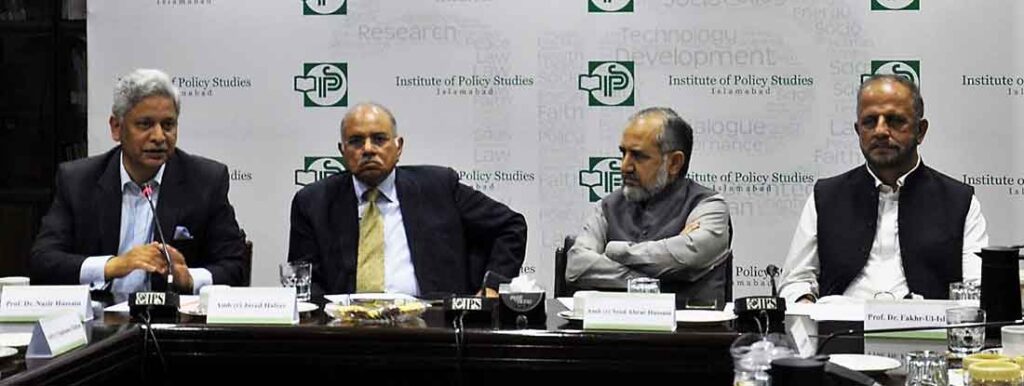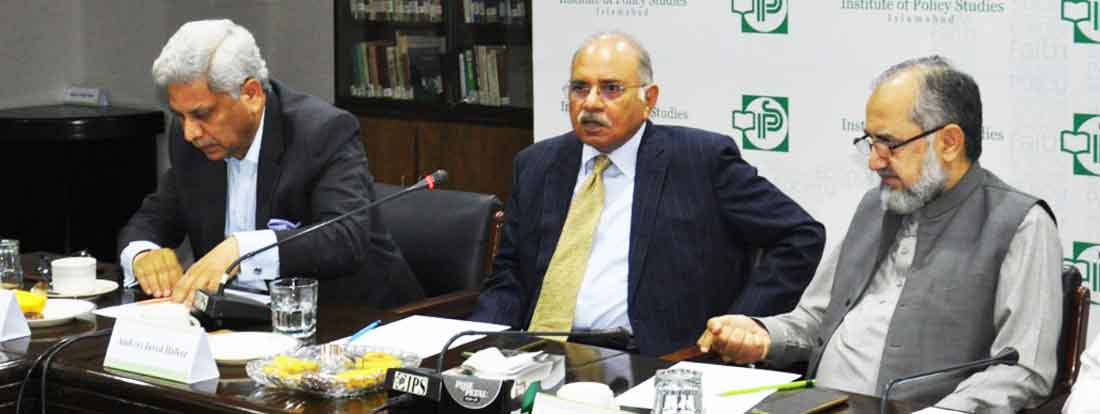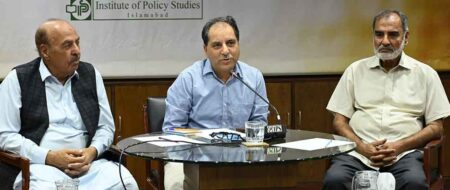‘Iran-Saudi Rapprochement: New Power Dynamics of the Middle East’
Iran-Saudi rapprochement termed blow to Indo-US ambitions, hope for regional peace, progress
The China-brokered Saudi-Iran rapprochement is a blow to the Indo-US ambitions in the Western Indian Ocean region, especially the Gulf. It also provides an opportunity for Pakistan in terms of benefits beyond economic development, including mitigation of proxy wars and sectarian conflicts.
Regional security analysts and academics observed this at a session titled ‘Iran-Saudi Rapprochement: New Power Dynamics of the Middle East’ organized by IPS on July 26, 2023.
The speakers and discussants included Ambassador (r) Javed Hafeez, as the keynote speaker, Ambassador (r) Syed Abrar Hussain, vice chairman (academics), IPS, Prof Dr Nazir Hussain, former dean, social sciences, Quaid-i-Azam University, Islamabad, Dr Amna Mahmood, dean, social sciences, International Islamic University Islamabad (IIUI), Prof Dr Fakhr-ul-Islam, director research & academic outreach at IPS, and IPS’ research fellows Dr Tughral Yamin, Brig (r) Said Nazir and Dr Azhar Ahmad.

The China-brokered Saudi Arabia-Iran rapprochement has rekindled hope for a positive future of the geopolitical environment of the Middle East and its peripheries, and socioeconomic progress of the larger region, the experts concurred.
Analyzing the significance of the restoration of diplomatic ties between Iran and Saudi Arabia, Ambassador Javed mentioned that this development and the peacemaking role of China, in contrast to the war-waging approach of the US, has changed the region’s geopolitical landscape.
In addition to pushing a diplomatic solution to the conflict, creating a stronger trend in geoeconomics, and fostering a resolution-conducive environment for other regional states, this rapprochement can have far-reaching implications for geopolitics, socioeconomic development, and stability in the region, he said.
Regarding the new power dynamics emerging in the region, he said that despite China’s mediation and increasing influence, America would not end its presence in the Middle East anytime soon as the US and West have vital interests in this region, i.e., securing the sea lanes for energy export, the security of Israel, combatting terrorism, and defense and military equipment deals.
Despite that the diplomatic restoration has toned down the rivalry, both Iran and Saudi Arabia are still vying for regional dominance and control, said Dr Nazir. Hence, some problems still linger between them and require more cooperative and de-escalatory efforts.
Stating the potential of Saudi Arabia as a growing economy and Iran as having a huge trade potential after sanctions are lifted, he proposed that Saudi Arabia and Iran, along with Pakistan and China, can form a consortium to undertake trade and investments.
Dr Amna said this rapprochement would also benefit Pakistan beyond economic development, including the mitigation of proxy wars and sectarian conflicts. To avail of this opportunity, Pakistan needs to be vigilant and dynamic in the continuity of its policies.
As states have started reassessing their strategic preferences and realigning themselves, Pakistan must also learn how to catch up with the changing strategic environment and increasing geoeconomics influence within geopolitics based on long-term national interests, said Dr Azhar.
Compared to the earlier delicate balancing act, Pakistan could adopt a more relaxed position in its relations with Saudi Arabia and Iran, he added.
Dr Tughral mentioned that because of the significant US presence in the region and the ingrained reservations among the people of Iran and Saudi Arabia towards each other, it would take time before other problems start resolving and true rapprochement takes place.
The speakers said that the Gulf and Middle Eastern states would mostly maintain good relations with China and the US in this evolving regional situation. They would leverage inter-power competition to their advantage. This development would also enhance China’s role in the region and help to fast-track its trade and commerce inroads into Africa and the MENA region.
In his closing remarks, Ambassador Abrar mentioned that evolving situations also create new stakes in other states. As other nations will have stakes in Pakistan, Pakistan’s leadership needs to recognize this as being in the country’s interests.












